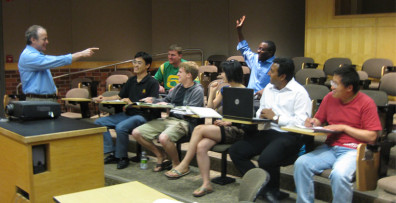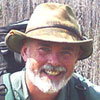Neil Ivory Named Inaugural Hohenschuh Distinguished Professor
sue@susanweaver.net


Professor Cornelius (Neil) Ivory has been named as the inaugural Paul Hohenschuh Distinguished Professor in the Gene and Linda Voiland School of Chemical Engineering and Bioengineering.
The professorship, which was recently created by Paul Hohenschuh and Marjorie Winkler, was announced at the Voiland School’s spring advisory board meeting. The professorship is to be used to recruit and/or retain a world-class, internationally-recognized faculty member, providing annual funding support for materials, equipment, staff, graduate student salaries or other support that furthers his or her research program.
A faculty member at WSU since 1989, Ivory is a well-known researcher in the area of bioseparations, where his work is focused on the development of novel systems to enable molecular-level protein separations and purification. The work has important implications in a variety of areas ranging from separations of radionuclides for national defense to purification of proteins that are used in pharmaceuticals and other health-related applications.
Ivory worked with his students to develop a separation technique called dynamic field-gradient focusing, which enables the isolation and purification of specific desired and undesired molecules by trapping them in an electric field gradient. Using this and other separation techniques, he is working with his collaborators to develop a blood test that may be used in a physician’s office to quickly and simply identify protein biomarkers that indicate if a patient is at-risk of suffering a heart attack. He also has worked with pharmaceutical companies to develop ways to better detect impurities in commercial pharmaceuticals, and is applying his technologies to enable the purification and detection of specific radioactive isotopes that have implications for national defense. Ivory holds five patents, with several others pending, and has more than 80 refereed publications. He holds a M.S. and Ph.D. from Princeton University in chemical engineering and received his bachelor’s degree from the University of Notre Dame.

The Hohenschuh professorship employs a unique gift mechanism that allows the donor to commit a specific gift amount for a set period of years to support a faculty position or a scholarship. While most chairs and professorships have typically come from an endowment established in a donor’s estate plan, this new annual gift mechanism allows a donor to fund faculty and students immediately, says Don Shearer, associate director of development for the Voiland School. In so doing, the donor is able to immediately see the gift’s impact.
Hohenschuh (‘64 BS, ‘70 MS) grew up in Washougal in rural southwestern Washington. When he came to WSU with support of a scholarship, he was overwhelmed by the rigorous program in chemical engineering as well as continual financial stress. Two professors, George Austin, who was department chair, and Harry Stern, were particularly instrumental in helping him at critical times in continuing his education. He went on to become vice president of manufacturing of Genentech, a leading biotechnology/pharmaceutical company. He is now retired.
“We are grateful to Paul and Marjorie for their investment in the faculty of this school,”said Jim Petersen, director of the Voiland School. “With this support, they are helping to enhance the school’s performance, helping grow its reputation while ensuring that we have the best faculty teaching engaging, challenging, and educating our students. In so doing they’re showing how much they care about and support the School’s mission. They will truly make a difference in the lives of both chemical engineering and bioengineering students.”

